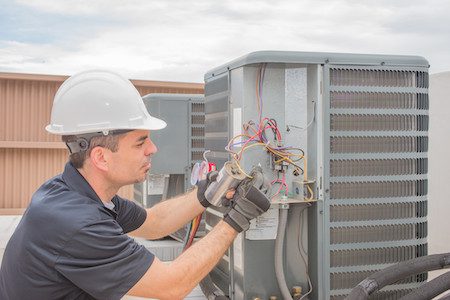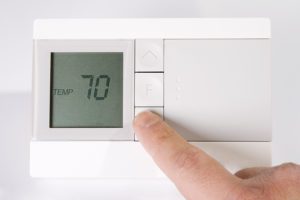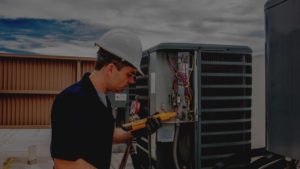Repairing Vs. Replacing HVAC System: Which Is The Right Choice For You?

When your HVAC system breaks down, your first instinct is probably to call a repair technician. But is it really worth it to repair your HVAC? Or is replacing your HVAC system the more cost-effective option?
The answer depends on the age of the system, the type of issues you’re experiencing, and many other factors. For instance, in most situations, minor repairs can save you lots of money. Specifically, timely repairs prevent big complications that would damage your system and shorten its lifespan.
Conversely, it’s a waste of money to keep repairing a system that’s already outdated or dying. Furthermore, it’s possible that your particular HVAC issue can be fixed with some simple DIY maintenance.
Now, if you’re not sure what to do about your HVAC problems, don’t worry. We’ve written you the following guide to help you determine the most cost-effective course of action. Read on to learn more.
Try DIY HVAC Maintenance First
Many HVAC problems have very simple causes that you can fix on your own. Here are a few important maintenance/troubleshooting steps you should perform before you call a repair technician.
Change Your Air Filter
When you operate your HVAC, it blows air through your air filter. As it does, the air filter traps dust and other particulate contaminants to improve your indoor air quality.
However, the filter can only hold so much. Eventually, it fills to capacity and blocks the airflow.
The system has to work much harder to function when it’s clogged in this way. This can cause heating and cooling problems, high energy bills, and system damage.
Therefore, the first thing you must do to troubleshoot your HVAC is to change the air filter. Also, set up a reminder to make sure you change it again after two to three months.
Check Your Fuel Level
If your furnace isn’t blowing warm air, you may simply be out of fuel. Check the fuel level now and refill it if necessary.
Check Your Thermostat Settings
A lot of heating and cooling problems are caused by the thermostat. Namely, it may be set incorrectly or malfunctioning.
Test all the features of your thermostat one by one right now. This should include the heater and air conditioner settings.

This way, you should be able to tell if your thermostat is malfunctioning. If it is, replace it.
Next, find out if your thermostat is running based on a preprogrammed schedule. Specifically, make sure it’s running a schedule/manual setting that’s approved by you.
Also, keep the members of your household from messing with these settings. The only way you can rule out thermostat problems is to put one person in charge of the thermostat.
Signs You Should Repair Your HVAC
Now let’s look at some common HVAC issues that could possibly be repaired. Or, to save time, skim through this list to find the problem you’re experiencing. If you’ve already done the troubleshooting steps listed above, simply call an HVAC technician now to get the repairs you need.
1. AC Air Is Warm
Warm air from your AC is usually caused by a blockage in the system, an insufficient amount of refrigerant, or a failing compressor. If the airflow is strong, and you’ve recently changed the air filter, you can probably rule out a blockage.
Also, check the outside AC unit for ice buildup. You can usually remove ice buildup by running the fan without the AC or heater activated. Aside from these troubleshooting steps, you’ll probably need to call a repair technician.
2. Furnace Air Is Cold
If your furnace is blowing cold air, check the fuel level and replace the air filter. Next, check the pilot light.
Is the pilot light out? You should be able to relight the pilot yourself.
If the pilot seems like it’s struggling (flickering, sputtering), you might have a faulty/dirty igniter. In this case, call for professional repairs.
3. Weak Airflow
Weak airflow is usually caused by one of two things: a blockage or a malfunctioning fan. So, first, check the fan in the outdoor unit.
If it seems to be running slowly, you should try applying lubricant. Also, clear out any debris that might be blocking the fan blade, such as plants or litter. Make sure the system is shut off completely before you attempt these steps.
Conversely, if the fan is running normally but the airflow is still weak, there’s probably a blockage. Make sure the air filter and all the vents are clean. If the problem persists, call an HVAC professional.
4. Your House Is Very Humid In Summer
Your AC should naturally dehumidify your indoor air as it cools your house. Note: this is not true of swamp cooler air conditioners.
Typically, the excess humidity in your indoor air indicates that your refrigerant is low. Call an HVAC company to check your system.
5. The Furnace Burns Fuel Too Fast
If your furnace runs out of fuel very fast, check near the fuel tank for signs of fuel leaks. Shut the system down immediately and call for emergency HVAC repair if you have a fuel leak.
Another possible cause is that your system is working too hard. This, too, may be caused by a blockage or a malfunctioning fan.
In this case, follow the same steps you would for troubleshooting weak airflow, as described above. For oil furnaces, you can also try adjusting the pressure of your oil pump.
6. The System Won’t Turn On
If your furnace won’t turn on, troubleshoot the pilot light as described in section two above. And make sure the gas valve is open and the fuel tank is full.
Aside from this, your HVAC might be experiencing electrical problems. Check the circuit breaker and make sure all the switches are turned on. If the problem persists, shut the system down and call a repair technician.
7. The System Shuts Off Randomly
You might also notice that your HVAC shuts off shortly or immediately after it turns on. This is caused by the same issues that prevent your system from turning on. Thus, the same troubleshooting steps apply here as well.
8. The System Runs Constantly
If your HVAC is running all the time, even though the thermostat is set appropriately, it’s working too hard. Check the fan for signs of malfunction or blockage. Try lubricating the fan and clearing it of any debris.
Change the air filter and make sure vents are clean and unobstructed. After that, all you can do is call for professional repairs.
9. Wierd Smells Coming From Your HVAC
We could describe loads of odd HVAC smells here. But the only important thing to know is that all HVAC odors indicate potentially serious problems. You should have a professional investigate these smells right away.
10. Your HVAC Makes Strange Sounds
Most odd noises that come from your HVAC are caused by an obstructed fan blade or a loose component. You can troubleshoot the fan using the steps mentioned above (clearing debris, lubricating).
If there’s a knocking noise coming from your oil furnace, there could be air bubbles trapped in the system. You can solve this by bleeding the furnace.
For all other noises, call a repair professional to solve the problem. Furthermore, if you hear a grinding metal noise, shut the system off and get emergency HVAC repairs. Grinding metal components could spark a house fire.
11. Moisture Is Leaking From Your AC Unit
Never attempt any DIY troubleshooting if you notice moisture puddled around your AC system. This could mean that your AC is leaking refrigerant, which can be toxic.
Signs You Should Replace Your HVAC
While most HVAC problems can be fixed, there comes a time in which repairs are no longer worth it. If the situations below apply, look into replacing your HVAC right away.
1. Your System Is Expensive To Run
Your HVAC becomes less efficient with age, regardless of maintenance and repairs. If your energy bills are ridiculously high in summer and winter, consider replacing your HVAC.
2. Your System Is Too Old
To give a ballpark figure, your HVAC will last about 10-15 years before it’s kaput. If it’s already 10 years old, get a professional inspection to determine if it needs replacing.
3. Your System Is Not Functioning Efficiently
Besides costing a lot, your old, you’ll notice that your inefficient system doesn’t heat or cool your house well enough. For your own sake, replace it.
4. The HVAC Can’t Reach Some Rooms
Another sign of a dying system is that your house isn’t heated or cooled evenly. Specifically, the rooms farthest from the central indoor unit aren’t affected much when you run the HVAC.
5. Constant Breakdowns/Repairs
Repairing your HVAC several times per year is a waste of money. Save money with HVAC replacement.
6. Your AC Unit Uses Freon
Freon is a toxic, problematic, and therefore, outdated refrigerant. Replace your AC if it uses freon.
7. The HVAC Is Outdated
Furthermore, any system that’s 10-years-old or older employs antiquated technology, anyway. A new HVAC system will be more efficient than your current system ever was.
When in Doubt, Get an Inspection
While general guidelines are helpful, we encourage you to get a professional inspection if you experience any HVAC problems at all. Also, you should schedule professional maintenance twice per year (just before summer and winter).
Get More Resources For Replacing an HVAC System
With this guide, you should be able to determine whether you need HVAC replacement or repair. In addition, we have other important resources that can help you when replacing an HVAC system.
For instance, check our blog for additional guides, including tips on minimizing HVAC cost. Or, go here to request free HVAC quotes from contractors in your area.






Leave a Reply